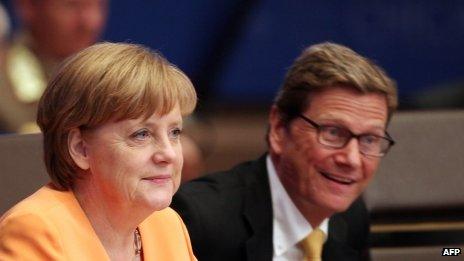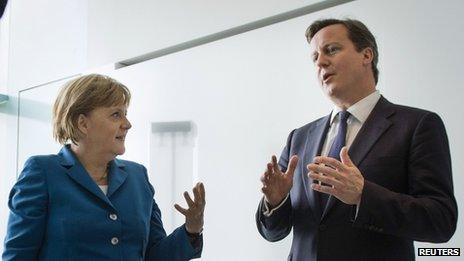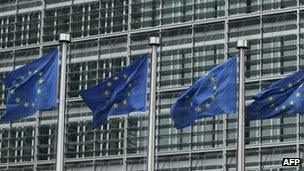'More Europe!': Germany's battle-cry for the eurozone
- Published
- comments

Chancellor Angela Merkel and her Foreign Minister Guido Westerwelle say the crisis needs "more Europe"
It is the rallying cry of Germany's Chancellor Angela Merkel as she points to what she thinks is the way out of the euro mire.
"More Europe means that we must give up more powers to Europe," Mrs Merkel says.
She said it again after meeting the leaders of Spain, France and Italy in Rome: "The lesson of this crisis is more Europe, not less Europe."
But is Berlin's ceding power to Brussels also the route to a United States of Europe?
The Future Group
A picture of the German conception of Europe's future is emerging from the utterances of the German foreign minister, Guido Westerwelle, and through the newly published interim report of what is known as the Future Group, which he set up.
The proposals are:
• More European power to determine the economic and tax policies of the member states. There should be a "transfer of sovereignty" to the European centre
• A strengthening of the EU's "foreign office", with a common European foreign and security policy
• A smaller European Commission able to make decisions faster
• A bigger role for the European Parliament to make "stronger democratic legitimacy"
• A directly elected President of Europe
• A European army
United States of Europe?
So is it a USE - a United States of Europe? There are certainly similarities with the USA - with its central power over economics and common foreign policy.
Without saying United States of Europe, Mr Westerwelle justifies the move to "more Europe" by citing the current crisis in the eurozone.

Disconnect: Prime Minister Cameron sees too much integration as harmful
"It is the worst crisis that Europe has ever faced. We have to learn the right lessons from it. Decision-making in Europe is often too slow," he says.
"Unfortunately, a cold wind of repatriation is sweeping through the European Union. The grand idea of Europe is in danger."
He goes on: "But the truth is that we need more Europe, not less. Europe must stand up for itself, for the idea of cultural unity. Steps towards a genuine political union would make a tangible contribution to ending the crisis."
Mr Westerwelle has some weight behind him. A Future of Europe Group that he set up is made up of fellow foreign ministers from Belgium, the Netherlands, Luxembourg, Austria, Spain, Portugal, Italy and Poland.
It is not clear if France is in or out. It sent an official to the early meetings with a promise of a foreign minister after the election.
'Too fast, too far'
But 17 of the 27 countries in the European Union were left out, including Britain and Sweden which are both sceptical about more power going to Brussels.

More power for Europe or was it too far too fast?
One Swedish diplomat was quoted by Spiegel magazine as saying that the German foreign minister was not contributing to EU co-operation by leaving some countries out.
And it should be said that what Mr Westerwelle thinks is not always what Mrs Merkel thinks. He may be the foreign minister but he comes from a different party in the coalition.
But "more Europe" is their shared desire.
In Britain there is a view, certainly within the Conservative Party which dominates the coalition government, that the lesson to be drawn from the crisis is that European integration went too fast and too far.
In the Eurosceptic view, European integration was ill-advised because the peoples of Europe were not ready for it. They would baulk, so the argument runs, at being pushed and jostled towards a single identity.
In the German view, pushing towards a unified identity is precisely what now needs to be done.
Can they both stay in the same boat if they are rowing in opposite directions? Might they squabble and tip the whole thing over?